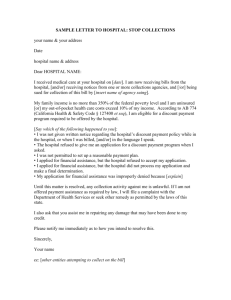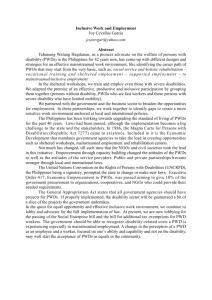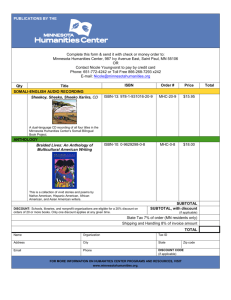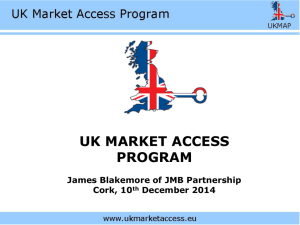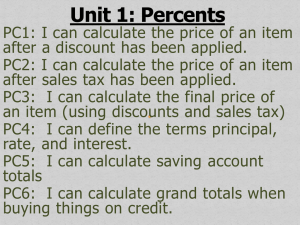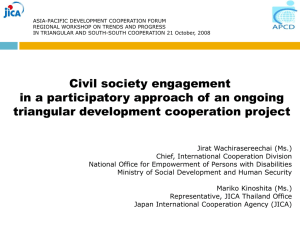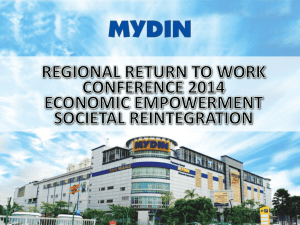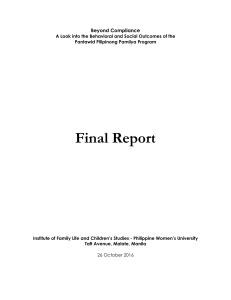Document
advertisement
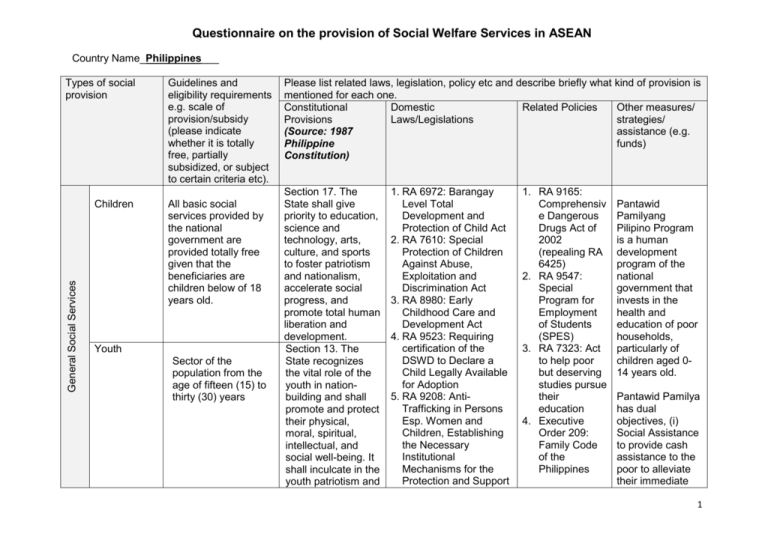
Questionnaire on the provision of Social Welfare Services in ASEAN Country Name_Philippines___ Types of social provision General Social Services Children Guidelines and eligibility requirements e.g. scale of provision/subsidy (please indicate whether it is totally free, partially subsidized, or subject to certain criteria etc). All basic social services provided by the national government are provided totally free given that the beneficiaries are children below of 18 years old. Youth Sector of the population from the age of fifteen (15) to thirty (30) years Please list related laws, legislation, policy etc and describe briefly what kind of provision is mentioned for each one. Constitutional Domestic Related Policies Other measures/ Provisions Laws/Legislations strategies/ (Source: 1987 assistance (e.g. Philippine funds) Constitution) Section 17. The State shall give priority to education, science and technology, arts, culture, and sports to foster patriotism and nationalism, accelerate social progress, and promote total human liberation and development. Section 13. The State recognizes the vital role of the youth in nationbuilding and shall promote and protect their physical, moral, spiritual, intellectual, and social well-being. It shall inculcate in the youth patriotism and 1. RA 6972: Barangay Level Total Development and Protection of Child Act 2. RA 7610: Special Protection of Children Against Abuse, Exploitation and Discrimination Act 3. RA 8980: Early Childhood Care and Development Act 4. RA 9523: Requiring certification of the DSWD to Declare a Child Legally Available for Adoption 5. RA 9208: AntiTrafficking in Persons Esp. Women and Children, Establishing the Necessary Institutional Mechanisms for the Protection and Support 1. RA 9165: Comprehensiv e Dangerous Drugs Act of 2002 (repealing RA 6425) 2. RA 9547: Special Program for Employment of Students (SPES) 3. RA 7323: Act to help poor but deserving studies pursue their education 4. Executive Order 209: Family Code of the Philippines Pantawid Pamilyang Pilipino Program is a human development program of the national government that invests in the health and education of poor households, particularly of children aged 014 years old. Pantawid Pamilya has dual objectives, (i) Social Assistance to provide cash assistance to the poor to alleviate their immediate 1 nationalism, and encourage their involvement in public and civic affairs. Older Persons All Filipino residents who are 60 years old and above are entitled to the benefits and privileges granted RA 9994. It may cover elderly “dual citizens” of Trafficked Persons 6. RA 9262: Anti-Violence Against Women and Their Children Act of 2004 7. RA 9775: Anti-Child Pornography Act of 2009 8. RA 9344: Juvenile Justice and Welfare Act of 2006 9. PD 603: Child and Youth Welfare Code of the Philippines 10. RA 8044: Youth in Nation Building Act 1. RA 9994: Expanded Senior Citizens Act of 2010 2. RA 7876: An Act Establishing a senior citizens center in all cities and municipalities of the need (short term poverty alleviation); and (ii) Social Development to break the intergenerational poverty cycle through investments in human capital. Other services provided to Children: - Child Protective Services - Alternative Family Care (Adoption, Foster Family Care, Legal Guardianship) - Travel Clearance to Minors - Government Internship Program Government’s National Social Pension Program implemented by the DSWD provides a monthly stipend 2 who can prove Filipino citizenship and at least 6 months residency in the Philippines. Under RA 9994: Senior citizens are entitled to the following: a) discount privileges, 20% discount on the purchase of certain goods and services, special 5% discount on prime commodities and basic necessities, 5% utility discount on electric and water consumption, and 50% discount on electric, water and telephone consumption of senior citizens centers and residential or group homes. b) free services, c) exemptions, d) incentives, e) government financial assistance, and f) Priority in express lanes. Philippines of P500 to indigent senior citizens as mandated by Republic Act 9994 or the Expanded Senior Citizens Act of 2010. Residential care faculties that provides care to male and female senior citizens aged 60 and above Occupational Therapy services to enhance vocational skills, promote holistic wellbeing. 3 PWDs Minimum of 20% discount on: a) establishments relative to the utilization of all services in hotels and similar lodging establishments (i.e. restaurants etc.) b) purchase of medicines in all drugstores c) medical and dental services d) fare for domestic air and see travel e) public railways, skyways and bus fare f) educational assistance To the extent practicable and feasible: - continuance of the same benefits and privileges given by the Government Service Insurance System (GSIS), Social Security System (SSS), and PAG-IBIG, as the case may be, as are enjoyed by those in actual 1. RA 9442 (amending ra 7277): Magna Carta for Disabled Persons 2. Accessibility Law 344 Rehabilitation Sheltered Workshop (RSW) facility that provides vocational/social rehabilitation and skills training for socioeconomic independence and productivity. Community-based Sheltered Workshop for PWDs provides livelihood training and productive employment. National (and Area) Vocational Rehabilitation Center (N/A VRC) – A nonresidential facility that implements programs and provides services to PWDs on vocational/ social rehabilitation and skills training. Center for the Handicapped – A non- residential facility that 4 - Women service; government may grant special discounts in special programs for persons with disability on purchase of basic commodities, subject to guidelines to be issued for the purpose by various agencies implements programs and provides services to PWDs. Section 12. The State recognizes the sanctity of family life and shall protect and strengthen the family as a basic autonomous social institution. 1. RA 9208: Antitrafficking in Persons of 2003 2. RA 9262 AntiViolence Against Women and Their Children Act of 2004 3. RA 9710: Magna Carta of Women Section 14. The State recognizes the role of women in nation-building, and shall ensure the fundamental equality before the law of women and men. Destitute Section 9. The State shall promote a just and dynamic social order that will ensure the prosperity and 1. RA 8425: Social Reform and Poverty Alleviation Act 2. RA 924: National Health Insurance Act of 1995 RA 10354: Responsible Parenthood and RH Act 2012 RA 10175: Philippine Cybercrime Prevention Act of 2012 Community based and residential services for Women in Especially Difficult Circumstances INA Healing Center that provides psychosocial support to bereaved mothers for empowerment and healing. Self-Employment AssistanceKaunlaran (SEAK) – A capabilitybuilding program in coordination with the Local 5 independence of the nation and free the people from poverty through policies that provide adequate social services, promote full employment, a rising standard of living, and an improved quality of life for all. Government Units (LGUs), designed to enhance the socio-economic skills of poor families to establish and selfmanage a sustainable community-based micro-credit organization for entrepreneurial development. Tindahan Natin (TN) Project – A national government initiative for job generation, livelihood and food security. It provides lowpriced but good quality rice noodles to low income families through a store jointly identified and endorsed and coordinated by the various national entities. Displaced Persons 1. RA 10121: Philippine Disaster Risk Reduction and Management Act of 2010 RA 8371: The Indigenous People’s Rights Act of 1997 6 Others Section 10. The State shall promote social justice in all phases of national development. Section 11. The State values the dignity of every human person and guarantees full respect for human rights. 1. RA 8972: Solo Parents Welfare Act 2. RA 9433: Magna Carta for Public Social Workers 3. RA 8371: The Indigenous People’s Rights Act of 1997 Section 22. The State recognizes and promotes the rights of indigenous cultural communities within the framework of national unity and development. 7

